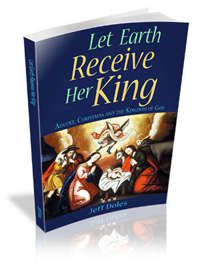Now when Herod was dead, behold, an angel of the Lord appeared in a dream to Joseph in Egypt, saying, “Arise, take the young Child and His mother, and go to the land of Israel, for those who sought the young Child’s life are dead.” (Matthew 2:19-20)
In the previous dream, which directed Joseph to take the baby Jesus and His mother and flee to Egypt, there was the promise of a new word that would come. That angel said, “Stay there until I bring you word, for Herod will see the young Child to destroy Him” (Matthew 2:13). And now here was that new word: “Arise, take the young Child and His mother, and go to the land of Israel, for those who sought the young Child’s life are dead.”
The threat had passed, and the promise of the first dream remained: “You shall call His name JESUS, for he will save his people from their sins” (Matthew 1:21). God had showed Himself faithful to His Word. And He would continue to do so, even as another threat emerged:
Then he arose, took the young Child and His mother, and came into the land of Israel. But when he heard that Archelaus was reigning over Judea instead of his father, Herod, he was afraid to go there. And being warned by God in a dream, he turned aside into the region of Galilee. (Matthew 2:21-22)When Herod died, he divided his kingdom among his three remaining sons (the ones he did not already have killed). To the cruelest one, Archelaus, he gave the region of Judea, subject to the approval of Rome. Galilee came under the rule of Herod Antipas, who was much less vicious than his brother.
So Joseph brought Jesus and Mary back to Israel, but not to Judea, which he had originally anticipated. Archelaus posed a new threat, and God was faithful to advise Joseph about it. Joseph and his family returned to Israel, but settled in the region of Galilee and a place called Nazareth.
And he came and dwelt in a city called Nazareth, that it might be fulfilled which was spoken by the prophets, “He shall be called a Nazarene.” (Matthew 2:23)There is no one prophet who makes such a statement in the Old Testament. Matthew is gathering together a few prophetic ideas and bringing them to a conclusion. One such prophetic text might be Isaiah 11:1, which tells of a “branch” (Hebrew netzer) which would grow out from the roots of Jesse (father of King David). This would be a play on words between the Hebrew netzer and the name of the town Nazareth.
It may also have to do with the sullied reputation Nazareth had developed. In the Gospel of John, when Phillip went to his friend, Nathanael, and said, “We have found Him of whom Moses in the law, and also the prophets, wrote — Jesus of Nazareth, the son of Joseph,” Nathanael answered, “Can anything good come from Nazareth?” (John 1:45-46). This would go along with Isaiah’s prophecy that Messiah would be despised and rejected:
For He shall grow up before Him as a tender plant,But none of these things mattered. They could not stop the angelic dream. They could not undo the plan of God and destroy His promise: The little Child named Jesus would grow up and save His people from their sins!
And as a root out of dry ground.
He has no form or comeliness;
And when we see Him,
There is not beauty that we should desire Him.
He is despised and rejected by men,
A Man of sorrows and acquainted with grief.
And we hid, as it were, our faces from Him;
He was despised, and we did not esteem Him.
(Isaiah 53:2-3)
When God gives a dream, the enemy will try every way he can to stop it. But if we will hold onto God and His Word, and always be listening for His voice, He will bring us through to the place of fulfillment.

Let Earth Receive Her King
Advent, Christmas and the Kingdom of God
by Jeff Doles
Preview with Amazon’s “Look Inside.”
Available in paperback and Kindle (Amazon), epub (Google and iTunes) and PDF.
